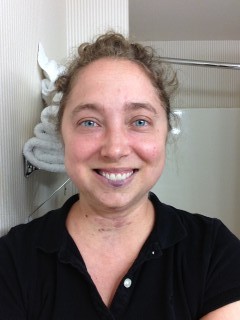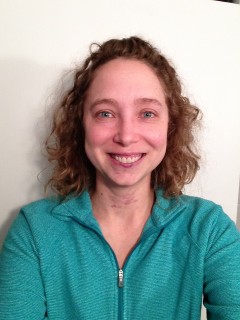I feel like I must begin my personal story of Cushing’s disease by first acknowledging that I am one of the “lucky ones” that this disease has happened upon. Maybe I feel the need to tell the story this way to remind myself that I am in fact one of the lucky ones, especially in the moments when I experience the unwellness that is part of the recovery period. Mostly, I feel the need to tell the story this way because my heart bleeds for the countless number of people who have Cushing’s and are experiencing its worsening symptoms, but neither they nor their doctors have definitively determined that the cause is Cushing’s. For the people, who in the active phase of having this disease, cannot get out of bed due to pain and exhaustion, who experience serious anxiety and depression, and/or who have a grocery list of health problems. For the people who have been diagnosed with Cushing’s but who, for some reason, are not good candidates for surgery and must experiment with other less effective treatment options. For the people who have a recurrence, those who already went through the battle with Cushing’s once and had thought that they had won only to find out they were going to have to muster up the will to fight again, knowing that their chances of victory are less the second time around. For the people who experience this disease without a strong support network and feel very alone in the process of it all. I will never be glad that I had an ACTH-hormone-secreting tumor in my pituitary gland that caused me to have Cushing’s disease. However, circumstances being what they were, I have to admit that I was (relatively) lucky.
 I was functional in the active phase of my Cushing’s disease (although, yes, every day I felt and looked less like myself and every day was a struggle to keep things normal and to feel like a good partner to my husband and mother to my kids).
I was functional in the active phase of my Cushing’s disease (although, yes, every day I felt and looked less like myself and every day was a struggle to keep things normal and to feel like a good partner to my husband and mother to my kids).
I was ultimately diagnosed (although, yes, diagnosis was nearly four years after I started experiencing physical symptoms and seeking related medical help).
I was a good candidate for the best treatment – neurosurgery (although, yes, I never particularly wanted to experience neurosurgery in my lifetime – immediately post-op I thought, for the first time in my life, that I was going to die; not fun!).
I was able to have surgery at one of the best pituitary centers in the world (although, yes, it was a trying exercise in personal advocacy getting myself there).
I did not experience the possible serious complications from pituitary surgery like cerebral spinal fluid leaks, diabetes insipidus, and adrenal crisis (although, yes, I did experience posterior nosebleeds that could only be stopped in the operating room – when the first one occurred in the middle of the night I thought, for the second time in my life, that I was going to die.).
I had the support network of generous family and friends (although, yes, having Cushing’s disease and recovering from it has still often felt like an incredibly lonely experience that no one else truly understands).
 So here I am – nearly 5 months post-surgery and my pituitary is still not working, which I understand is good news. From what I have read and heard, patients whose pituitary takes 18 months or more to recover have the best chances for long-term remission. At the time of surgery, I weighed 177 pounds (I am nearly 5’10”) and I now weigh 150. I was taking high blood pressure medications and I now take none and have normal blood pressure. I woke up constantly throughout the night and now less so. Currently, my shoulders, knees, and feet are the sources of many of my aches and pains. I have lost muscular strength, cardiovascular stamina, and flexibility. I still wake up most mornings feeling like I’ve been hit by a truck. Or two. Or three. (It’s the scale I have come to use with my husband to relay to him how I’m feeling at a particular moment.: “This morning I felt like I’d been hit by two trucks but now it’s more like one. Progress!”).
So here I am – nearly 5 months post-surgery and my pituitary is still not working, which I understand is good news. From what I have read and heard, patients whose pituitary takes 18 months or more to recover have the best chances for long-term remission. At the time of surgery, I weighed 177 pounds (I am nearly 5’10”) and I now weigh 150. I was taking high blood pressure medications and I now take none and have normal blood pressure. I woke up constantly throughout the night and now less so. Currently, my shoulders, knees, and feet are the sources of many of my aches and pains. I have lost muscular strength, cardiovascular stamina, and flexibility. I still wake up most mornings feeling like I’ve been hit by a truck. Or two. Or three. (It’s the scale I have come to use with my husband to relay to him how I’m feeling at a particular moment.: “This morning I felt like I’d been hit by two trucks but now it’s more like one. Progress!”).
I hope that I never experience Cushing’s disease again. I know that it is something that I will always be looking over my shoulder for, convinced that it’s back and that I’ll have to buck up and fight it again. Having this disease has caused me to see both my human strength and my human frailty. Long story short, I’m more anxious now. Wondering what will be the next thing to fight. And wondering if it will be a more formidable opponent than Cushing’s. I feel more aware of my mortality, and, if I’m being honest, I don’t like it. But it’s a truth that I can’t ignore and from which I try to humbly accept the sense of urgency that comes from knowing such a truth – an urgency to love and to be grateful, demonstrating my love and gratitude as often as I can every day.
Member: 163114
State: Virginia
Newsletter: Summer, 2017



